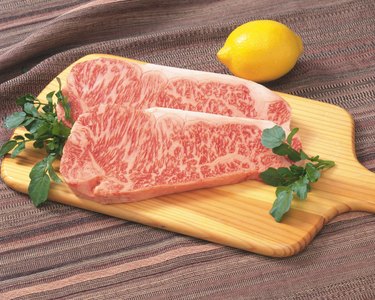
If the food you're eating tastes sweet, chances are good that it contains some type of sugar such as fructose. This simple sugar is present in a wide variety of foods, some healthy and some unhealthy. Fruit, honey, syrups and confections are among the most common sources of fructose. If you have a fructose intolerance, restrict your intake of the sugar to avoid symptoms such as bloating, abdominal pain, gas, diarrhea and heartburn.
Meat and Protein Foods
Video of the Day
Fresh meat and protein foods are naturally free of fructose. A serving of fresh beef, pork, chicken or turkey, for example, are fructose-free foods to include in your diet. Fresh seafood, such as salmon, trout, crab legs or shrimp, are also free of fructose. The key is to eat the meat and seafood without the addition of sauces that contain fructose. Fresh herbs and spices are one way to season the meat without adding fructose. Skip condiments, such as barbecue sauce, ketchup and steak sauce, because most of these contain fructose. Beans, eggs, nuts, seeds and tofu are additional protein foods that don't contain fructose.
Video of the Day
Dairy Products
Many dairy foods don't contain fructose, but reading labels is essential because some dairy products contain added sugar, much of it in the form of high-fructose corn syrup. Fresh milk and cheese don't contain fructose. Plain yogurt can be fructose-free, as well, but read the ingredient label to be sure. Sweetened milks, such as chocolate, strawberry or vanilla, contain fructose, according to the University of Wisconsin Madison School of Medicine and Public Health. Flavored yogurts, milkshakes and malts are additional dairy foods to avoid.
Certain Vegetables
Asparagus, leeks, onions, tomatoes and artichokes are examples of vegetables to avoid if you have a fructose intolerance, but most other vegetables can a have place in your fructose-free diet. Most vegetables that contain small amounts of fructose are well-balanced with glucose, which means that they aren't as likely to cause a problem, according to the University of Wisconsin Madison School of Medicine and Public Health. Carrots, green beans and leafy greens, such as spinach and kale, are examples of vegetables to include in your diet.
Fruits and Fructose
Though fruits contain fructose, you can safely eat a few varieties of fruit even if you're intolerant of the sugar, according to Wayne G. Shreffler, author of "Understanding Your Food Allergies and Intolerances." Berries, pineapple, kiwis, citrus fruit, melon and papaya are examples of fruits lower in fructose and more easily tolerated by people with a fructose intolerance.
Miscellaneous Fructose-Free Foods
Foods with dextrose, glucose, raw sugar, sucrose and sugar substitutes, such as aspartame, are safe on a fructose-free diet, according to the University of Wisconsin Madison School of Medicine and Public Health. Avoid foods that contain sorbitol, which is an artificial sweetener, as your body converts it to fructose during the digestive process, according to Shreffler. Brown rice, gluten-free cereals and breads, rice noodles and rye bread are usually safe on a fructose-free diet, too.
- American Gastroenterological Association: Understanding Food Allergies and Intolerances
- Georgia State University: Sugars
- University of Wisconsin Madison School of Medicine and Public Health: Medical Nutrition Therapy: Fructose-Restricted Diet
- Understanding Your Food Allergies and Intolerances; Wayne G. Shreffler, M.D. Ph.D., et al.